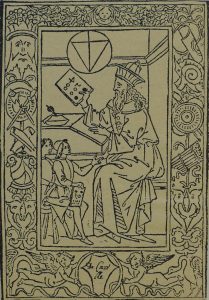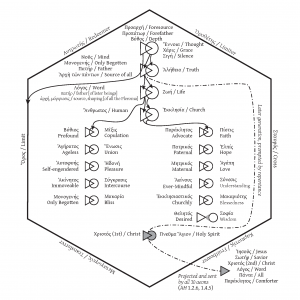Podcast episode
October 22, 2018
Episode 47: The Numbers Don’t Lie: Joel Kalvesmaki on ‘Pythagorean’ Number

We asked ourselves a simple question: how do things like numerology, gematria, and arithmology – occult sciences of number which take various forms in western esotericism – come to be associated with the name of Pythagoras? Dr Kalvesmaki has looked into this stuff very deeply, and in this episode gives a beautifully-balanced account of the development of what we might call ‘esoteric number in theory and practice’ in the Græco-Roman world. The interview contains quite a bit of original, unpublished research (you heard it here first!) and comes to some conclusions which may surprise listeners.
We divide our subject-matter into three main branches for the purposes of discussion:
- Divinatory numerologies (using numbers in various ways to determine future events),
- Gematria (using the numerical values of words to find hidden correspondences between the words, and often between the things signified by the words),
- Arithmology (metaphysical speculations about number as a prime constituent of reality itself).
The typology, however, quickly succumbs to the reality, a world in which all manner of numerical (and alpha-numerical) speculation and practice was happening; in the case of the Marcosian Gnostics, for example, the lines between these three sorts of numerical speculation seem to blur or even disappear. The interview is wide-ranging and comprehensive, but also hugely informative about specifics when the evidence allows. Highly recommended.
Interview Bio:
 Joel Kalvesmaki is a Byzantinist, digital humanist, and esoteric number expert. At the time of the interview he oversaw the production of Dumbarton Oaks’ flagship Byzantine publications, both print and digital. He is active in the digital humanities, bringing new technologies to bear on scholarly communication. His research and scholarship covers intellectual history in late antiquity, with a specific focus on ancient number symbolism and the writings of Evagrius Ponticus. He maintains this useful website, where you can find much more about all things numerological and arithmological.
Joel Kalvesmaki is a Byzantinist, digital humanist, and esoteric number expert. At the time of the interview he oversaw the production of Dumbarton Oaks’ flagship Byzantine publications, both print and digital. He is active in the digital humanities, bringing new technologies to bear on scholarly communication. His research and scholarship covers intellectual history in late antiquity, with a specific focus on ancient number symbolism and the writings of Evagrius Ponticus. He maintains this useful website, where you can find much more about all things numerological and arithmological.
Works Discussed in this Episode:
Primary:
- Hippolytus reflects on the kinds of techniques used in doing numerological prognostications: Refutation of All Heresies 4.14.
- Irenaeus of Lyon on the Beast 666 (or is that 616?): Against Heresies 5.30, with New Testament fragment attestations recorded in critical editions of the New Testament, s.v.
- ––– on theValentians’ system: Against Heresies 1, passim. The Nag-Hammadi Valentian text mentioned in the episode is The Ogdoad Reveals the Ennead, our best primary source for the kinds of numerical metaphysics which we associate with the Valentinian and Marcosian Gnostics.
- Leonides, 1st c. poet: see Page, D. L. Further Greek Epigrams. Cambridge: Cambridge University Press, 1981. Pp. 503–41.
- Plutarch describes cultivated dinner-time psephic composition: Table Talk 5. pref; 9.2-3.
- Epitaph: Iasos 419, the incredible acrostic/psephic epitaph discussed in the episode, is covered by Dr Kalvesmaki in the article ‘Isopsephic Inscriptions from Iasos (“Inschriften von Iasos” 419) and Shnān (” IGLS” 1403)’, Zeitschrift für Papyrologie und Epigraphik : 261-268.
- The ‘Little Pythagorean Plinth’: this important numerological text remains unedited in the manuscript-shelves. Get to work, people!
Secondary:
- Burkert, W., 1972. Lore and Science in Ancient Pythagoreanism. Harvard University Press, Cambridge, MA.
- Chrisomalis, Stephen, 2010. Numerical Notation: A Comparative History. Cambridge University Press, Cambridge.
- Zhmud, L. (2016). ‘Greek Arithmology: Pythagoras or Plato?’. In: Forms and Transfers of Pythagorean Knowledge: Askesis–Religion–Science, Harrassowitz, Weisbaden. A go-to introduction to the question of how ‘Pythagorean’ this stuff is, and also includes references to Delatte’s coining of the term ‘arithmology’, which we mentioned in the episode.
Recommended Reading:
The Isopsephy Database project is a wonderful tool for quickly checking out whether a given number found in a Greek text has any intriguing verbal content.
- Kalvesmaki, J., 2013. The Theology of Arithmetic: Number Symbolism in Platonism and Early Christianity. Center for Hellenic Studies, Washington, DC.
- Sambursky, Shmuel. ‘On the Origin and Significance of the Term Gematria.’ Journal of Jewish Studies 29 (Spr. 1978): 35–38.
- Yarbro-Collins, A. (1982). ‘Numerical Symbolism in Jewish and Early Christian Apocalyptic Literature’, ANRW II : 1222-1287.
- Zhmud, L. (2016). ‘Greek Arithmology: Pythagoras or Plato?’. In: (Ed.), Forms and Transfers of Pythagorean Knowledge: Askesis–Religion–Science, Harrassowitz, Weisbaden.

Themes
Arithmology, Gematria, Gnosticism, Interview, Numerology, Overview, Philosophy, Valentinianism


Albert Hand
October 1, 2020
Turns out there is a piece of electronic music called “The Theology of Arithmetic” https://soundcloud.com/belial-pelegrim/the-theology-of-arithmetic
Jacob Eddinger-Smith
August 16, 2022
What is the numerical system according to which Nero’s name would supposedly equal 666? According to the system I’ve heard described on SHWEP, the omega alone in ΝΕΡΩΝ would equal 800?
Jacob Eddinger-Smith
August 16, 2022
Sorry, I should have searched online before asking: Hebrew transliteration.
Jacob Eddinger-Smith
August 16, 2022
–of “Nero Caesar”, ha!